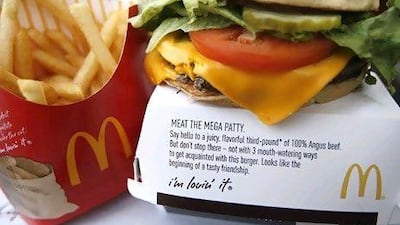McDonald's UAE says it should take no blame for the incidence of obesity in the country, despite enjoying stellar growth in sales this year.
As the dominant force in the global burger business, the company has come in for its share of criticism.
Rafic Fakih, the managing director for Emirates Fast Food, which runs and owns McDonald's outlets in the UAE, says the company cannot be blamed for the country's widespread obesity because it offers customers a range of healthy options and has a relatively small share of the market.
"It's a common perception of the quick-service restaurant business that it is unhealthy, and it's a wrong perception." he said. "Our market share is only 13 per cent of the informal eating out segment in the UAE, so how can we be responsible for a huge problem?"
A recent survey by Seha, the Abu Dhabi health services company, found that 29 per cent of children in the capital were either overweight or obese.
McDonald's, which has 90 outlets in the UAE, expects sales growth in its stores to be 7 to 8 per cent this year, higher than the 5 per cent global average announced by McDonald's Corporation last week.
Mr Fakih said McDonald's enjoyed double-digit growth in sales in June, as tourists flocked to the Emirates instead of visiting other countries in the region.
The company looks to be fighting off strong competition from so-called gourmet burger restaurants and Subway, which is expanding rapidly in the Emirates.
"We are going to open our first restaurant in Umm Al Qaiwain and we will have another eight to nine stores open this year," Mr Fakih said. "We have to grow because there is a demand for us. We receive calls and emails because people want us in their emirate or area."
The company has invested much time and effort in educating customers about the ingredients and fat content in its food, and organised sporting events to encourage youngsters to exercise.
"At the end of the day, if you go home and eat potatoes every day you will have a problem," Mr Fakih said.
Professor Salim Adib, the manager of public health and research at the Health Authority in Abu Dhabi, says fast-food companies should work with the Government to help improve the quality of food.
"If they do not make steps voluntarily to change the composition of the food, like they have been doing in other countries, they will have to be regulated," Prof Adib said. "I'm sure they would not want that to happen because then they will be painted the villain. If they announce it themselves they are seen as socially responsible."
He said the abuse of fast food and the tendency to eat it as a snack in between meals was the root of the problem.
"We cannot blame McDonald's for the cause of the epidemic in the country, it's a phenomenon with lots of causes," he said.
In May this year, McDonald's Corporation hit back at calls in the US to ban McDonald's from marketing to children, saying the trademark clown Ronald McDonald would continue to entertain them.

